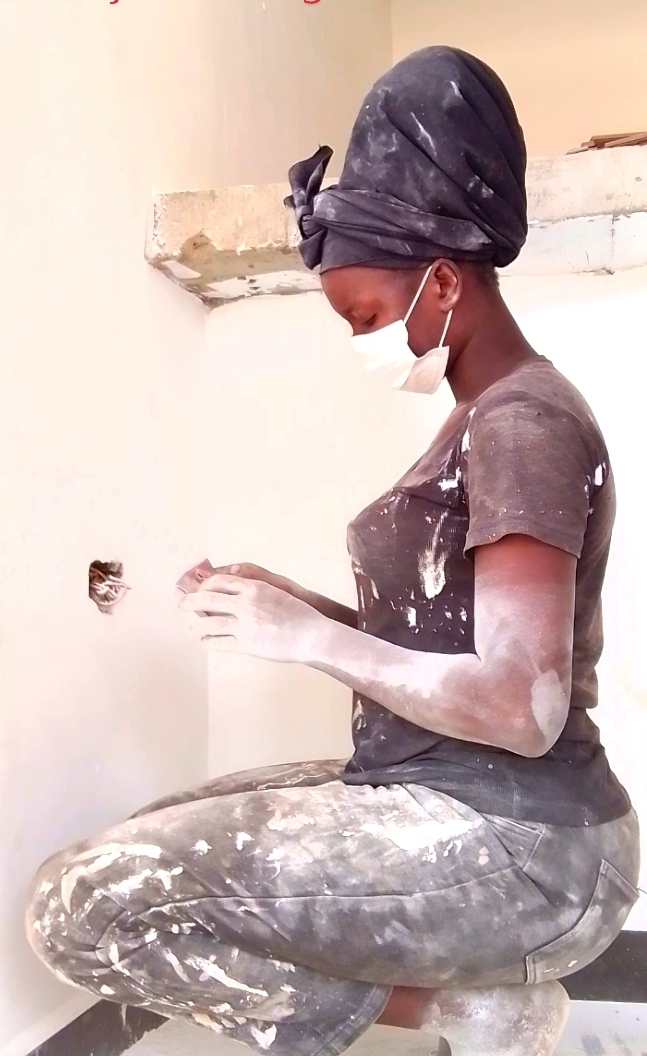South Sudan's English Daily Newspaper
"We Dare where others fear"

By Benjamin Takpiny
Aker Angui just wanted a job and indulge in the world of workaholics before things get tough, so enrolled in a job that in South Sudan is generally categorized as a male job, painting.
Now a few months into the work, the 20 year old senior four leaver has silenced many voices which sought to discourage her.
“My family has been providing everything for me, especially my mother, a very strong woman, she is the one who raised us up and covered all our needs. My elder brother is also very strong , he is providing for us but I asked myself for how long should I depend on my parents and yet I am already a grown up person? I have my two hands, legs, eyes, so I decided to work for myself to see how people really work,” Angui told The Dawn in an interview in Juba.
South Sudan is a male dominated society and women doing such work as construction usually get a backlash from community members.
“I just came up with this idea of looking for work, to be independent, and went out in the morning and got people doing construction work. I told them I want to join this work- they laughed at me, they told me this work is too hard for me but I insisted until they accepted me to work with them,” Angui said.
“At first I used to mix cement, carrying bricks, I followed the guys who did the painting , until I learned how to paint.”
Angui is relatively better off in a country where employment is hard to come by and cost of living stands at the peak.
She can take 15,000 SSP or at times 7,000 SSP in a day.
“What made me to do this kind of work is to be independent financially,” she said.
“I am doing this kind of work to empower young women around me so that they know women are capable of doing any kind of work than relying on others for their needs.”
Angui’s parents have not been exceptionally happy with her decision, knowing they can fend fully for her needs but the young lady is decisive in personally investing in her future.

“I told them there Is nothing lacking but I am trying to be independent because i wwill not remain with my parents forever and I don’t know the kind of husband I am going to marry,” she said.
“I told my parents if people are keeping me like an egg, my future will be dark if I marry lazy person later on so let me try to be independent early like this so that I will be able later on to take care of myself and my family.”
To understand the progress context in Angui’s practical future prospectus, let’s look at a story of Madam Maa Zenai, published by the United Nations Sustainable Group in April 2022.
Mama Maa who lives in the eastern part of Qinghai province, on the vast Tibetan Plateau was faced with few opportunities to earn a living in this remote, sparsely populated region.
Most men migrate to cities in search of work, leaving behind women and the elderly to care for homes and farms. Much of the productive land would lie abandoned.
Ever since her son-in-law died many years ago, Madam Maa has cared for and financially supported her granddaughter, Zhang Yuhan, now 14 years old.
They used to live close to China’s national poverty line, each making do with around US$2 a day.
But Mama Maa decided to brave every issue affecting her.
When she heard of a project, an initiative active in Qinghai, she immediately signed up. Through trainings, she learned how to keep her cattle healthy and how best to market and sell them. She received high-quality livestock feed and support with building a new shed. And for the first time, she also got the chance to participate in discussions about gender equality.
Her story goes on- today, Madam Maa earns 30,000–40,000 yuan (about US$4,800–6,300) a year.
Her family secured a stable, long-term source of income, and they were even able to build a comfortable new home.
In South Sudan, women have been kept at the backyard and when difficult issues arise, they have been disillusioned in deriving solutions. All cultures place men as dominant in society and even households, men are the sole decision makers. The crisis which began in 2013 in the country left hundreds of thousands of people dead, displaced four million others and devastated a virgin economy that was just building up after independence two years earlier.
Women and children as well as vulnerable people bored the biggest brunt of the crisis and now after its end, the women continue to suffer immensely as widows, single heads of families and with no coping mechanisms or experience to face the future solidly.

Angui, like Mama Maa does not believe she will be caught up in any predicaments in life and has started early.
“My plan is to go for course of civil engineering after my results,” She said.
“I will continue with my dream career which is international relations and diplomacy. I will just go for training in order to have more skills in engineering.”
Above all, Angui who has been in the job for 5 months wants to shrug off misperception in society and “show the people that women are capable of doing any work.”
“There is nothing impossible in this world. All of us are capable of doing whatever we want to do, women are born to do something in the society and women are also capable of being leaders,” she said




